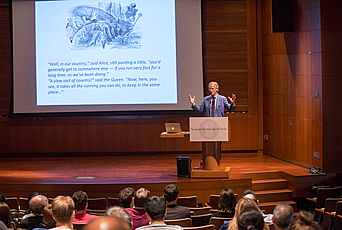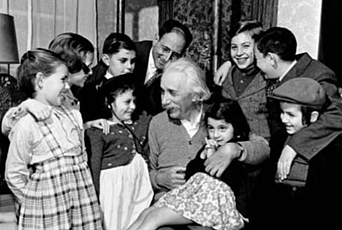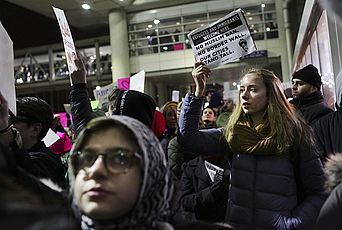IAS Response to Executive Orders Restricting Travel and Immigration
In recent months, the Institute for Advanced Study has issued public statements in response to the original and revised executive orders that restrict travel from predominantly Muslim countries. The orders, currently suspended, cause us great concern and alarm given the Institute’s international scope and unwavering belief in nondiscrimination. Our founding principles are rooted in inclusion and excellence. From 1930 on, our scholars have been selected on the basis of their ability alone and with no regard to race, creed, or gender.
I would like to take the opportunity to share the Institute’s formal responses to the executive orders and related activities. I immediately wrote a letter on January 30 to the Institute’s Board of Trustees, Faculty and Emeriti, current Members and Visitors, and Staff.
To the Institute community,
I write to you with great concern regarding the federal executive order, which, on Friday, established travel restrictions for refugees and those coming to the U.S. from seven predominantly Muslim countries.
From our founding, the Institute has welcomed academics from around the world, irrespective of race, gender, and creed, with the simple requirement that they be dedicated to advancing scholarship. Bringing leading scholars from all of the world’s countries and regions and supporting their unfettered academic research, wherever it may take them, are among our core values. This was true in the 1930s when Faculty like Einstein, Weyl, and von Neumann came from Europe to the Institute, and it is true today as we welcome Faculty and Members from more than thirty countries.
As an institution, we take seriously the potential of the new federal executive order to interfere with our scholars’ ability to pursue their academic work. Since the order was issued, IAS staff have been working actively with affected scholars, and we will continue to provide support, guidance, and information as matters develop.
Should you or any of your colleagues have questions or concerns or need assistance at this time, please contact Michael Klompus, Chief Human Resources Officer, or Jennifer Hansen, Visa and Visitor Services Coordinator. Michael or Jennifer will provide whatever support members of our community need and will guarantee privacy.
True to its mission and history, the Institute will always be a strong advocate for the unobstructed flow of scholars across the world. In the meantime, we are committed to doing everything we can within the limits of the law to protect and support those who are affected by this executive order. We will provide updates and information as the situation evolves and the implications of the executive order are more clearly known. In the meantime, please do not hesitate to reach out should you wish to be in touch.
The Institute Faculty authored a subsequent statement, signed by Faculty, Emeriti, and Trustees, on February 1.
The Institute for Advanced Study, since its founding in 1930, has provided an unbiased environment for international scholars to pursue vital and groundbreaking work in the sciences and humanities. Its mission is to recruit the world’s most prominent scholars, “in the spirit of America at its noblest” and “with no regard whatsoever to accidents of creed, origin or sex.” Against the backdrop of Fascism’s rise in Europe and in the best tradition of American higher education, some of the intellectual giants of the twentieth century, immigrants and refugees themselves, found a safe haven within our walls, among them Albert Einstein, Kurt Gödel, Erwin Panofsky, and John von Neumann.
It is therefore with deep conviction regarding the freedom of inquiry and intellectual exchange and the respect for the principles of justice and non-discrimination that we, the undersigned, condemn and oppose the recent federal executive order that suspends the entry of refugees, immigrants, and other visitors. It unnecessarily and unfairly impedes scholars, students, and more generally individuals and families, in particular those fleeing persecution, from traveling to the United States. It is contrary to the values of the international community to which we belong. We believe that the advancement of the sciences and humanities must make no distinction—geographical, political, or religious—among people. We stand unified against the unjust and discriminatory restrictions of the executive order, and we are committed to doing everything we can within the limits of the law to protect and support those who are affected.
A subsequent statement was issued in response to the revised executive order on March 7.
The revised executive order unnecessarily and unfairly singles out and impedes the ability of people from six Middle Eastern and African countries from traveling to the United States unless they already hold visas or green cards. This order, as with the previous order issued in January, continues to directly conflict with the Institute for Advanced Study’s founding principles and values, unwavering belief in non-discrimination and inclusion, and fundamental mission to provide a free and open environment for basic research in the sciences and humanities.
As an institution, we oppose the revised travel ban on the principles of justice and non-discrimination and stand in unison for the advancement of knowledge without borders and prejudice.
In addition, the Institute is among nearly two hundred professional scientific, engineering, and education societies, national associations, and universities that have signed a letter sent to President Trump by the American Association for the Advancement of Science (AAAS). Given the uncertainty that has ensued since the orders were issued, the Institute invited current Members and our campus community to participate in a forum for discussion and exchange on this and related concerns. An outcome of these meetings was the formation of the History Working Group, which includes six Members across three of our four Schools, who were prompted to study materials in the Institute’s Shelby White and Leon Levy Archives Center and collaboratively write the three articles in this issue.
We are taking the current political climate and its incursion into academic freedom very seriously. The Institute is deeply committed to protecting the integrity of its fundamental mission—to provide a free and open environment for curiosity-driven research in the sciences and humanities. We will continue to advance knowledge without borders and prejudice, and to act as a strong advocate when this is challenged.
Robbert Dijkgraaf
Director and Leon Levy Professor


